Foreign News
UK tech tycoon among six missing after yacht sinks

British tech tycoon Mike Lynch and his 18-year-old daughter are among the six people missing after a luxury yacht sank off the coast of the Italian island of Sicily in the early hours of Monday morning.
The 56m (183ft) vessel was carrying 22 people including British, American and Canadian nationals. Fifteen people were rescued, including a one-year-old British girl, and authorities are continuing their search into the night.
Local media reported the yacht, named Bayesian, capsized at about 05:00 local time after encountering a heavy storm overnight that caused waterspouts, or rotating columns of air, to appear over the sea.
Mr Lynch, known by some as “the British Bill Gates”, co-founded software company Autonomy, which was later bought by tech giant Hewlett-Packard for $11bn (£8.6bn).

Witnesses told Italian news agency Ansa that the Bayesian’s anchor was down when the storm struck, causing the mast to break and the ship to lose its balance and sink off the coast of village Porticello, near Sicilian capital Palermo.
A waterspout is similar to a tornado and can form over oceans, seas or large lakes.
Divers have identified a wreckage 50m below the water’s surface and are searching for those missing.
The director general of Sicily’s civil protection agency, Salvatore Cocina, told the BBC that Mr Lynch, his daughter Hannah Lynch and the yacht’s chef were among the missing.
He said the search, involving caving and rescue diving teams, would continue overnight.
The body of one man was found outside of the wreckage. His nationality has not been confirmed.
BBC Verify looked at corporate records and found the Bayesian’s ownership is tied to Mr Lynch’s wife, Angela Bacares. Sources close to the matter have confirmed to the BBC Ms Bacares has been rescued.
Fifteen people managed to get to safety after the storm hit.
Ansa news agency reported a 35-year-old mother held her one year old daughter in her arms in the sea.
The woman, named as locally as Charlotte Golunski, said: “For two seconds I lost the little girl in the sea, then I immediately hugged her again amidst the fury of the waves. “I held her tightly, close to me, while the sea was stormy. Many were screaming. “Luckily the lifeboat inflated and 11 of us managed to get on board.”
The baby is fine and the mother was treated with stitches, the agency said.
She added she had been on the boat with her husband, who is also safe, and colleagues from a London company.
A doctor based at the Di Cristina Hospital in Palermo, where some of the survivors were taken, said they were “very tired” and “constantly asking about the missing people”.
Dr Domenico Cipolla told Reuters news agency: “We have given the survivors this information, but they are talking and crying all the time because they have realised that there is little hope of finding their friends alive.”
Survivors said the trip has been organised by Mr Lynch for his work colleagues.
In the initial aftermath, a nearby Dutch-flagged vessel rescued survivors from the waves, tending to them until emergency services arrived.
Captain Karsten Borner said after the storm had passed, the crew noticed that the yacht that had been behind them had disappeared.
“We saw a red flare, so my first mate and I went to the position, and we found this life raft drifting,” he told Reuters. That life raft was carrying 15 survivors, three of whom were “heavily injured”, he said.
A local fisherman told Reuters news agency he had seen people being rescued by an inflatable boat dispatched from another yacht.
The captain of a local fishing trawler said he saw debris, including cushions from the deck, floating in the sea.
Footage from the wreckage site showed helicopters circling over several coastguard vessels as divers wearing bright orange descended into the water.
Eight of those rescued are receiving treatment in hospital, the Italian coastguard said.

The western half of the Mediterranean has experienced severe storms since the middle of last week. Through Sunday night and into Monday morning, a clutch of bad weather passed by the north coast of Sicily.
BBC Weather forecaster Matt Taylor said: “A waterspout is a tornado that has occurred over water rather than land. “They can form during intense storms, on the base of cumulonimbus/thunder clouds. “Turbulence, and the wind blowing in slightly different directions around the cloud, can cause rotation under the base of the cloud and the spout to form.
“Like tornadoes, they bring powerful winds, but instead of picking up dust and debris they cause a water mist around the column of rotating air.”
The UK Foreign Office said it is supporting a number of British nationals and their families following an incident in Sicily. Britain’s Marine Accident Investigation Branch is also sending a team of inspectors to conduct a “preliminary assessment” into the sinking of the UK registered-boat.
The Bayesian’s registered owner is listed as Revtom Ltd. The superyacht can accommodate up to 12 guests in six suites.
The yacht’s name is understood to be based on the Bayesian theory, which Mr Lynch’s PhD thesis was based on.
Mr Lynch’s wife Ms Bacares is named as the sole legal owner of Revtom registered in the Isle of Man.
A spokesperson for Camper and Nicholsons International, the firm that manages the 2008-built boat, told BBC Verify: “Our priority is assisting with the ongoing search and providing all necessary support to the rescued passengers and crew.”
Mr Lynch sold his company Autonomy to American computing giant Hewlett-Packard (HP) in 2011 for $11bn (£8.6bn).
But an intense legal battle following the high-profile acquisition loomed over Mr Lynch for over a decade. He was acquitted in the US in June on multiple fraud charges, for which he had been facing two decades in jail.
The sinking of the yacht came on the same day that Mr Lynch’s co-defendant in the fraud case, Stephen Chamberlain, was confirmed by his lawyer as having died after being hit by a car in Cambridgeshire on Saturday.
[BBC]
Foreign News
Thousands flock to New Zealand capital in huge Māori protests

More than 40,000 people have protested outside New Zealand’s parliament against a proposed bill seeking to reinterpret the country’s founding document between British colonisers and Māori people.
Tuesday’s demonstration marked the end of a nine-day hīkoi, or peaceful protest, that had made its way through the country.
The hīkoi swelled to one of the biggest in the country’s history, with many participants draped in colours of the Māori flag, as they marched through the capital Wellington.
It easily dwarfed the 5,000-strong crowd that turned up for land rights in 1975, and double the size of another major hīkoi in 2004, which rallied for shore and sea ownership rights.
Tuesday’s march brought together activists and supporters who opposed the bill, which was introduced by a junior member of the governing coalition, the Act political party.
The Treaty Principles bill argues that New Zealand should reinterpret and legally define the principles of the 1840 Treaty of Waitangi, a document that is seen as fundamental to the country’s race relations.
The party’s leader, David Seymour, says that over time the treaty’s core values have led to racial divisions, not unity.
“My Treaty Principles Bill says that I, like everybody else, whether their ancestors came here a thousand years ago, like some of mine did, or just got off the plane at Auckland International Airport this morning to begin their journey as New Zealanders, have the same basic rights and dignity,” Seymour, who has Māori ancestry, told the BBC.
“Your starting point is to take a human being and ask, what’s your ancestry? What kind of human are you? That used to be called prejudice. It used to be called bigotry. It used to be called profiling and discrimination. Now you’re trying to make a virtue of it. I think that’s a big mistake.”
The proposed bill was met with fierce opposition, leading to one of the biggest protest marches New Zealand has ever seen.
Wellington’s rail network saw what might have been its busiest morning ever as the hīkoi poured through the capital, according to the city’s transport chair Thomas Nash.
The Māori Queen Ngā Wai hono i te pō led the delegation into the grounds surrounding the Beehive, New Zealand’s parliament house, as thousands followed behind.

Meanwhile, inside the Beehive, MPs discussed the bill.
Among them was Prime Minister Christopher Luxon, who said it would not pass into law – despite him being part of the same coalition as Act.
“Our position as the National Party is unchanged. We won’t be supporting the bill beyond second reading and therefore it won’t become law,” Luxon said, according to the New Zealand Herald. “We don’t think through the stroke of a pen you go rewrite 184 years of debate and discussion.”
New Zealand is often considered a world leader when it comes to supporting indigenous rights – but under Luxon’s centre-right government, there are fears those rights are now at risk.
“They are trying to take our rights away,” Stan Lingman, who has both Māori and Swedish ancestry told the BBC. “The hikoi is for all New Zealanders – white, yellow, pink, blue. We will fight against this bill.”
Stan’s wife Pamela said she was marching for her “mokos”, which means grandchildren in the Māori language.

Other New Zealanders feel the march has gone too far.
“They [Māori] seem to want more and more and more,” said Barbara Lecomte, who lives in the coastal suburbs north of Wellington. “There’s a whole cosmopolitan mix of different nationalities now. We are all New Zealanders. I think we should work together and have equal rights.”
Equality, though, is still a way off, according to Debbie Ngarewa-Packer, co-leader of Te Pāti Māori (Maori Party).
“We can’t live equally if we have one people who are the indigenous people living ‘less than’,” she argued. What the coalition government is doing is “an absolute attempt to divide an otherwise progressive country and it’s really embarrassing”.
New Zealand’s parliament was brought to a temporary halt last week by MPs performing a haka, or traditional dance, in opposition to the bill. Footage of the incident went viral.
“To see it in parliament, in the highest house in Aotearoa, there’s been a real state of surprise and I think disappointment and sadness that in 2024 when we see politics and the Trump extremes, this is what the Māori are having to endure,” said Debbie Ngarewa-Packer. “It’s humiliating for the government because we [New Zealand] are normally seen as punching above our weight in all of the great things in life.”
Protest organisers on Monday taught participants the words and moves of the rally’s haka, the subject of which is Te Tiriti o Waitangi (the Waitangi Treaty). Those in the audience enthusiastically repeated the lyrics written on a large white sheet, trying to soak in as many words as possible ahead of the rally.
“This isn’t just any normal hīkoi – this is the hīkoi of everybody,” said grandmother Rose Raharuhi Spicer, explaining that they’ve called on non-Māori, Pacific Islanders and the wider population in New Zealand to support them.
This was the fourth hīkoi Rose had been on. She comes from New Zealand’s northernmost settlement, Te Hāpua, right above Auckland. It’s the same village that the most famous hīkoi started from, back in 1975, protesting over land rights.
This time, she brought her children and grandchildren.
“This is our grandchildren’s legacy,” she said. “It’s not just one person or one party – and to alter [it] is wrong.”
[BBC]
Foreign News
Top Hong Kong pro-democracy leaders jailed for years

A Hong Kong court has sentenced key pro-democracy leaders to years in jail for subversion, following a controversial national security trial.
Benny Tai and Joshua Wong were among the so-called Hong Kong 47 group of activists and lawmakers involved in a plan to pick opposition candidates for local elections. Tai received 10 years while Wong received more than four years.
A total of 45 people were found guilty of conspiring to attempt subversion, after two people were acquitted.
Their trial marked the largest use of the harsh national security law (NSL) which China imposed on Hong Kong shortly after the city’s explosive pro-democracy protest in 2019.
Those demonstrations saw hundreds of thousands taking to the streets in Hong Kong for months. Triggered by a proposed government treaty that would have allowed extradition from Hong Kong to mainland China, the protests quickly grew to reflect wider demands for democratic reform.
Observers say the NSL and the trial’s outcome have significantly weakned the city’s pro-democracy movement and rule of law, and allowed China to cement control of the city.
The US has described the trial as “politically motivated”. Australia said it had “strong objections” to the use of the NSL and it was “gravely concerned” by the sentencing of one of its citizens, Gordon Ng.
Beijing and Hong Kong’s government argue that the law is necessary to maintain stability and deny it has weakened autonomy. They also say the convictions serve as a warning against forces trying to undermine China’s national security.
“No one can engage in illegal activities in the name of democracy and attempt to escape justice,” China’s foreign ministry said on Tuesday. It also said that it was “firmly opposed” to Western countries “discrediting and undermining the rule of law in Hong Kong.”
The case has attracted huge interest from Hongkongers, dozens of whom queued up outside of the court days before the sentencing to secure a spot in the public gallery.
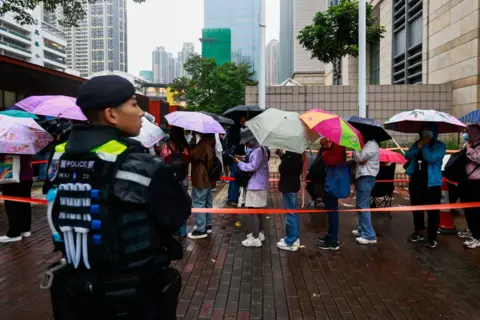
Standing in line on Tuesday was Lee Yue-shun, one of the two acquitted defendants. He told reporters he wanted to urge Hongkongers to “raise questions” about the case, as “everyone has a chance to be affected” by its outcome.
Inside the courtroom, family members and friends waved from the public gallery to the defendants, who appeared calm as they sat in the dock. Some in the gallery were seen tearing up as the sentences, which ranged from four to ten years, were read out.
Tai, a former law professor who came up with the plan for the unofficial primary, received the longest sentence with judges saying he had “advocated for a revolution”.
Wong had his sentence reduced by a third after he pleaded guilty. But unlike some other defendants, he was not given further reductions as judges “did not consider him to be a person of good character”. At the time of the arrests, Wong was already in jail for participating in protests.
In court, Wong shouted “I love Hong Kong” before he left the dock.
Other prominent pro-democracy figures who were sentenced include Gwyneth Ho, a former journalist who went into politics, and former lawmakers Claudia Mo and Leung Kwok-hung. They received sentences between four and seven years in prison.
As Leung’s wife, activist Chan Po-ying, walked out of the court at the end of the hearing, she was heard chanting a protest against his jail term.
After the 2019 protests dwindled with the Covid pandemic, activists organised an unofficial primary for the Legislative Council election as a way to continue the pro-democracy movement.
Their aim was to increase the opposition’s chances of blocking the pro-Beijing government’s bills. More than half a million Hongkongers turned out to vote in the primary held in July 2020.
Organisers argued at the time that their actions were allowed under the Basic Law – a mini-constitution that allows certain freedoms. They had “never imagined that they would be in jail just for criticising the government”, former opposition lawmaker Ted Hui, who took part in the primary and later fled to Australia, told the BBC’s Newsday programme.
But it alarmed Beijing and Hong Kong officials, who warned that the move could breach the NSL, which came into effect days before the primary. They accused the activists of attempting to “overthrow” the government, and arrested them in early 2021.
At the end of the trial, the judges agreed with the prosecution’s argument that the plan would have created a constitutional crisis.
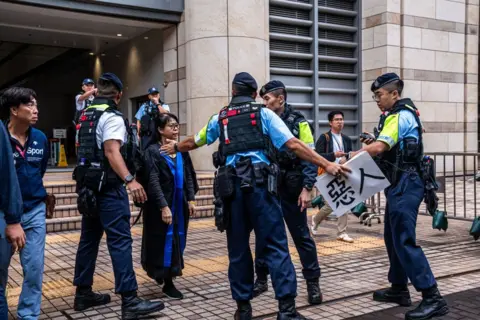
A Human Rights Watch spokesperson described Tuesday’s sentencing as showing “just how fast Hong Kong’s civil liberties and judicial independence have nosedived” since the enactment of the “draconian” NSL. They added that China and Hong Kong’s governments “have now significantly raised the costs for promoting democracy in Hong Kong”.
The pro-Beijing government may have used the trial to “settle scores” with the pro-democracy camp, said John P Burns, emeritus professor at the University of Hong Kong.
“Central authorities are also using the trial to re-educate the Hong Kong people,” Dr Burns said, with the lesson being “national security is the country’s top priority; don’t challenge us on national security’.”
“The case is significant because it provides clues to the health of Hong Kong’s legal system,” he told the BBC. “How can it be illegal to follow processes laid down in the Basic Law?”
Stephan Ortmann, assistant professor of politics at the Hong Kong Metropolitan University said the sentencing “set a precedent for the severity of punishments for political dissent under the NSL”.
The pro-democracy movement has now been “greatly weakened” where “self-censorship has become the norm”, he added.
Hong Kong activists say they have personally experienced the chilling effect.
Emily Lau, former chair of the Democratic Party of Hong Kong, said the fear of being arrested under the NSL is so great that “recently, we could not even organise a dinner party for members and friends. And that’s how stressful things are.”
“The fight will go on but in a peaceful and legal way,” Ms Lau told BBC Newsday.
“It doesn’t mean the Beijing government wins the hearts of the people,” said Sunny Cheung, an activist who ran in the 2020 primary but has since fled to the US.
“They might be happy in a way because the entire opposition is being wiped out… but at the same time, they lost the whole generation. They don’t have the trust of the people.”
[BBC]
Foreign News
Miss Nigeria’s pride after defying trolls to challenge for Miss Universe

Miss Nigeria, Chidimma Adetshina, has spoken of her pride at coming second in the Miss Universe competition, as well as being named Miss Africa and Oceania.
“I’m so proud of myself and I just made history,” she said, shortly after losing out to Miss Denmark, Victoria Kjær Theilvig.
Adetshina originally competed in the Miss South Africa contest, as she was born and grew up in the country, however she was subjected to trolling and xenophobic abuse because her father is Nigerian.
Last month, the South African authorities said they would strip her of her identity papers, following allegations that her mother, who has Mozambican roots, had committed identity fraud to gain South African nationality.
Neither Adetshina nor her mother have commented on the allegations. South African authorities pointed out that Adetshina could not have participated in any alleged fraud as she was an infant at the time.
After the furore in South Africa, and the doubts about her nationality, she competed in the Miss Nigeria competition, which she won to qualify for the Miss Universe contest held in Mexico City.
The eventual winner of Miss South Africa, Mia le Roux, pulled out of Miss Universe last week citing an undisclosed medical condition. She was the first deaf woman to become Miss South Africa.
In September, Adetshina, a law student, told the BBC that she still saw herself as ‘proudly South African’ and ‘proudly Nigerian’.
But after Miss Universe South Africa tweeted to congratulate her on her second place, along with both South African and Nigerian flags, some South Africans responded by saying she did not represent them.
In her BBC interview, Adetshina said she would be seeking therapy to help her deal with the trauma following the abuse she was subjected to.
She is the highest placed black African woman in Miss Universe since South Africa’s Zozibini Tunzi won the competition in 2019.
[BBC]
-
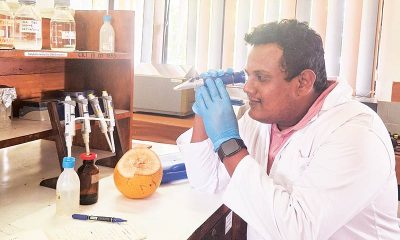
 Life style3 days ago
Life style3 days agoKing of coconuts heads for a golden future
-
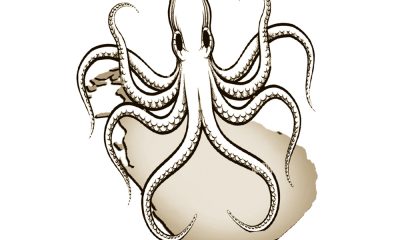
 Features7 days ago
Features7 days agoAdani’s ‘Power’ in Sri Lanka
-
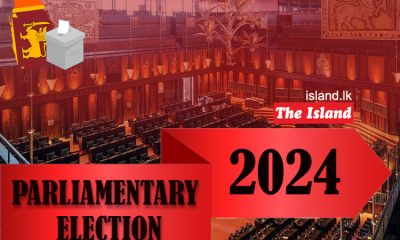
 Latest News4 days ago
Latest News4 days agoColombo district preferential votes announced
-

 News4 days ago
News4 days agoPresident warns his party: “We will fail if we view power as an entitlement to do as we please”
-
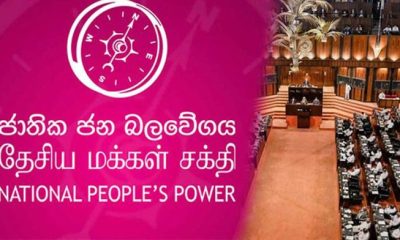
 News2 days ago
News2 days agoNPP appoints two defeated candidates as NL MPs
-

 Editorial7 days ago
Editorial7 days agoWhen millers roar and Presidents mew
-
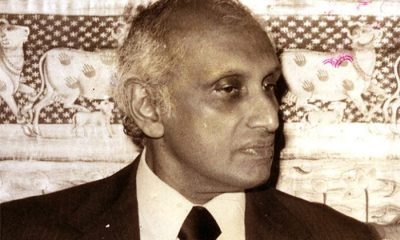
 Midweek Review7 days ago
Midweek Review7 days agoGamani Corea:
-
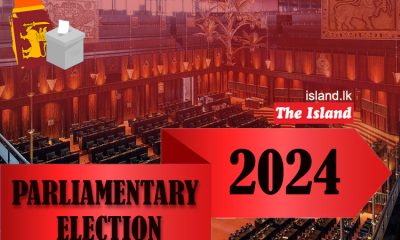
 Latest News5 days ago
Latest News5 days agoGampaha district: NPP 16, SJB 3











